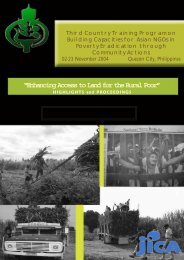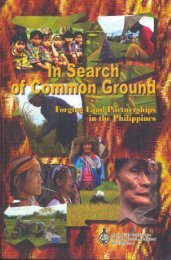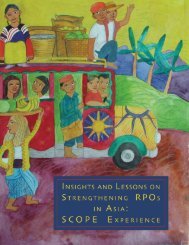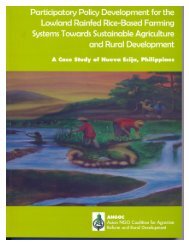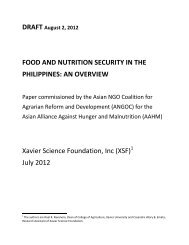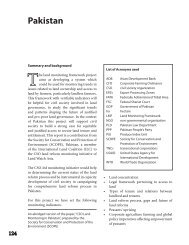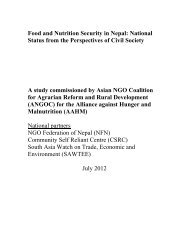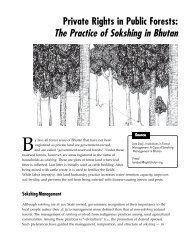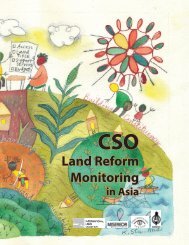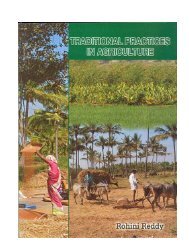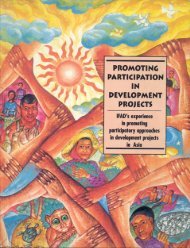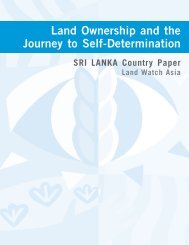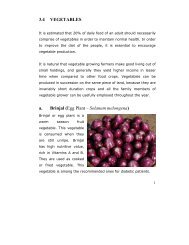Securing the Right to Land FULL - ANGOC
Securing the Right to Land FULL - ANGOC
Securing the Right to Land FULL - ANGOC
Create successful ePaper yourself
Turn your PDF publications into a flip-book with our unique Google optimized e-Paper software.
Ac<strong>to</strong>rs Facilitating or Impeding<br />
Access <strong>to</strong> <strong>Land</strong> and Tenurial<br />
Security<br />
Civil Society and National and International<br />
NGOs<br />
National Civil Society Organizations (CSOs)<br />
According <strong>to</strong> <strong>the</strong> NGO Statement <strong>to</strong> <strong>the</strong> 2007 Cambodian Development<br />
Cooperation Forum, Cambodia’s civil society groups are<br />
concerned with <strong>the</strong> following issues:<br />
The forced resettlement of people <strong>to</strong> make way for commercial<br />
interests. In particular, <strong>the</strong> urban poor, who hold land<br />
titles, are removed from <strong>the</strong>ir homes and resettled in places<br />
where <strong>the</strong>y have no access <strong>to</strong> basic services, such as water<br />
and sanitation.<br />
The allocation of ELCs without regard for regula<strong>to</strong>ry standards<br />
that are intended <strong>to</strong> protect local communities, especially<br />
indigenous peoples living in Cambodia’s nor<strong>the</strong>ast<br />
region, from land alienation.<br />
The insecurity of land tenure of rural dwellers, <strong>the</strong>ir loss of<br />
access <strong>to</strong> natural resources on which <strong>the</strong>ir livelihood depends,<br />
and <strong>the</strong> lack of alternative income sources.<br />
National CSOs have called on international donors <strong>to</strong> use <strong>the</strong>ir<br />
influence with <strong>the</strong> Cambodian Government <strong>to</strong> address <strong>the</strong>se<br />
issues. With roughly half of <strong>the</strong> national budget coming from<br />
international aid, donors carry a lot of clout with <strong>the</strong> Government.<br />
However, while <strong>the</strong> Government makes declarations of<br />
implementing <strong>the</strong> necessary reforms prior <strong>to</strong> donor meetings,<br />
<strong>the</strong>se come <strong>to</strong> naught afterward and <strong>the</strong> Government goes back<br />
<strong>to</strong> “business as usual.” Yet <strong>the</strong> pressure that international donors<br />
could bring <strong>to</strong> bear on <strong>the</strong> Government is real enough and<br />
national civil society groups intend <strong>to</strong> continue <strong>to</strong> take advantage<br />
of it.<br />
National civil society groups acknowledge that <strong>the</strong>y have less<br />
power and influence than international organizations, and<br />
that <strong>the</strong>y need <strong>to</strong> augment <strong>the</strong>ir financial and human resources<br />
and expand <strong>the</strong>ir geographical presence in order <strong>to</strong> get<br />
<strong>the</strong> government’s attention. None<strong>the</strong>less, <strong>the</strong>y still provide an<br />
important service <strong>to</strong> groups involved in land disputes, particularly<br />
by performing <strong>the</strong> role of negotia<strong>to</strong>r between <strong>the</strong> affected<br />
people and high-ranking officials and <strong>the</strong> private sec<strong>to</strong>r. Civil<br />
society groups are also able <strong>to</strong> elevate local issues <strong>to</strong> <strong>the</strong> national<br />
level through <strong>the</strong>ir membership in national networks.<br />
OVERCOMING A FAILURE OF LAW AND POLITICAL WILL<br />
69<br />
The National NGOs in Cambodia include Adhoc, Licadho, and<br />
Legal Aid of Cambodia. The network organizations are <strong>the</strong> NGO<br />
Forum of Cambodia, STAR Kampuchea, and <strong>the</strong> Cambodian Human<br />
<strong>Right</strong>s Action Committee. The Pagoda (monks) is also involved<br />
in <strong>the</strong> political affairs of <strong>the</strong> country.<br />
International Donors<br />
In 2004, <strong>the</strong> international donor community issued guidelines<br />
which <strong>the</strong> Cambodian Government must comply with in order<br />
<strong>to</strong> receive <strong>the</strong> promised funding support. The guidelines have<br />
yet <strong>to</strong> be implemented, yet every year international donors increase<br />
<strong>the</strong>ir funding support <strong>to</strong> <strong>the</strong> Government. In 2006, international<br />
donations <strong>to</strong> Cambodia amounted <strong>to</strong> US$601 million,<br />
excluding support given by China. The World Bank (WB) has<br />
frozen some of <strong>the</strong>se funds following reports of misuse, yet in<br />
2007 its own funding support <strong>to</strong> Cambodia rose <strong>to</strong> US$689 million.<br />
International donors have resisted calls by national CSOs <strong>to</strong> use<br />
<strong>the</strong>ir power <strong>to</strong> keep <strong>the</strong> Government in check. However, donors<br />
did acknowledge <strong>the</strong> importance of preserving <strong>the</strong> country’s<br />
biodiversity and natural resources, as well as <strong>the</strong> significant<br />
contribution of agriculture <strong>to</strong> <strong>the</strong> Cambodian economy. International<br />
donors do most of <strong>the</strong>ir work through Technical Working<br />
Groups (TWGs), on agriculture, water, forestry, and natural resources.<br />
Donors also work with relevant government ministries,<br />
but pay little attention <strong>to</strong> NGOs.<br />
Among <strong>the</strong> international development organizations working in<br />
Cambodia are <strong>the</strong> United Nations Development Programme<br />
(UNDP), UN Office of <strong>the</strong> High Commissioner on Human <strong>Right</strong>s<br />
(UNOHCHR), UN World Food Programme (WFP), <strong>the</strong> World Bank,<br />
and Asian Development Bank (ADB).<br />
World Vision, PLAN, Oxfam GB, GTZ, and Danida are a few of <strong>the</strong><br />
international donors with a presence in Cambodia. O<strong>the</strong>r groups<br />
include international media organizations, <strong>the</strong> embassies and<br />
consulates of foreign governments, etc.<br />
The Private Sec<strong>to</strong>r<br />
Private sec<strong>to</strong>r groups are concerned with resolving land disputes<br />
only <strong>to</strong> protect <strong>the</strong>ir investments. Public and private sec<strong>to</strong>r interests<br />
are frequently at odds with each o<strong>the</strong>r. Private sec<strong>to</strong>r groups<br />
are also disinclined <strong>to</strong> negotiate directly with affected communities<br />
and leave <strong>the</strong> task of conflict resolution <strong>to</strong> public authorities.<br />
ASIAN NGO COALITION FOR AGRARIAN REFORM AND RURAL DEVELOPMENT



